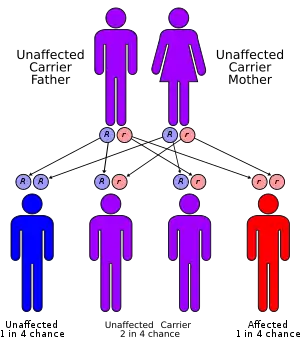Urocanic aciduria
Urocanic aciduria is an autosomal recessive metabolic disorder caused by a deficiency of the enzyme urocanase. It is a secondary disorder of histidine metabolism.[2]
| Urocanic aciduria | |
|---|---|
| Other names | Urocanate hydratase deficiency or Urocanase deficiency[1] |
 | |
| Urocanic acid | |
Symptoms and signs
Urocanic aciduria is thought to be relatively benign.[2] Although aggressive behavior and mental retardation have been reported with the disorder,[3] no definitive neurometabolic connection has yet been established.[2]
Genetics

Urocanic aciduria has an autosomal recessive inheritance pattern, which means the defective gene is located on an autosome, and two copies of the gene – one copy inherited from each parent – are required in order to be born with the disorder. The parents of an individual with an autosomal recessive disorder both carry one copy of the defective gene, but are usually not affected by the disorder.
Pathophysiology
The amino acid histidine, when catalyzed by the enzyme histidase, forms urocanic acid. Disruptions in this pathway, caused by a deficiency of histidase, is the underlying cause of histidinemia. This results in reduced levels of skin and serum urocanic acid, the primary indicator of insufficient histidase activity.
In urocanic aciduria, increased urocanic acid in the urine indicates a deficiency of the enzyme urocanase.
With normal to only slightly elevated levels of histidine present in the liver during urocanic aciduria, the only true metabolic indicator of the disorder can be found in the urine.[2]
Diagnosis
See also
- Inborn errors of metabolism
- Imidazole
- Aromatic amino acids
- Recessive disorders
References
- Imaeda M, Wada Y (1998). "Urocanic aciduria (urocanase deficiency)". Ryoikibetsu Shokogun Shirizu. 18 (1): 150–151. PMID 9590012.
- Disorders of histidine metabolism.
http://www.ommbid.com/OMMBID/the_online_metabolic_and_molecular_bases_of_inherited_disease/b/abstract/part8/ch80 - Kalafatic Z, Lipovac K, Jezerinac Z, Juretic D, Dumic M, Zurga M, Res L (1980). "A liver urocanase deficiency". Metabolism. 29 (11): 1013–1019. doi:10.1016/0026-0495(80)90209-7. PMID 6107814.